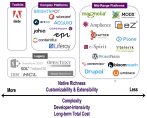Six Sigma for WCM
Because I completed my university degree and started working full-time at the age of 20 (I wanted nothing more than to finish school and be out in the "real world"), I am not particularly impressed by copious degrees, professional certifications, or letters after a person's name.
I know however that I am in the minority -- in previous jobs I have argued with fellow managers about the educational qualifications of the people we hired. ("I don't care if she's a certified PMP, has a PhD, and 5 other professional certificates. Has she ever actually managed a large, successful project? Can she inspire a team? Is she an effective communicator?") Education only gets you so far: what matters in my book is real experience and results. (Note, I have 3 PhDs in my immediate family, so I may now be uninvited to the holiday events.)
Recently I had an advisory session about web content quality control with a large, global Real Story Group research customer who adopted a new web content management system a year ago. They wanted to establish a culture of quality among their web content managers, and champion those who not only understood the system designed to manage dozens of global websites, but also possessed a certain level of experience and inherent attitude towards quality.
I suggested adopting a six-sigma-like / karate-oriented "belt" system that, after a base level of system training, was focused on levels of experience-based knowledge and, equally important, positive attitude and focus on content quality.
Here's a short summary of a longer deliverable:
WCMS yellow belt:
- Has taken 3 days initial WCMS training, is willing to ask for advice, proactive curiosity about WCM and how it works
WCMS blue belt:
- Minimum of 3 months using the system, showing inherent interest in the "health" of the system, proactive constructive attitude about content quality
- Understands the ramifications of content type changes, tagging, and other content editing tasks
- Takes responsibility at at a local level and derives improvement ideas for both the site(s) and the WCMS from experience
WCMS black belt:
- At least 6 months using the system, daily exposure to the WCMS, experienced as an admin
- Omniscience of the "big picture" of how the WCMS effects sites, knows and understands why it's important to do things correctly, encourages others to maintain quality
- Leads, delegates, and maintains content quality at a global level
One key question came up during the planning: "should we hire or promote someone into the black belt role?" Promote, promote, promote. Again, since this is about real-world experience in a particular environment and a particular company, it's like learning a language. Even if you learn to speak Spanish in Madrid, that doesn't cut it in Mexico City or the Andes. Black belts vary from dojo to dojo; the same should be true for WCMS black belts.
As such, there were many more criteria specific to the organization that defined these different levels, which I won't share here. Creating an operational framework that rewards system users based on their real-world experience, dedication to web content quality, and proactive attitudes towards system and content improvement is one way to make WCM a core part of how your team is evaluated. This approach can be adopted regardless of what platform you use, and also adapted for other types of technology.
As always, let us know if you need help.








